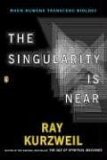Summary | Excerpt | Reviews | Beyond the Book | Readalikes | Genres & Themes | Author Bio

Critics' Opinion:
Readers' Opinion:
First Published:
Sep 2005, 672 pages
Paperback:
Sep 2006, 672 pages
Consider Gary Kasparov, who scorned the pathetic state of
computer chess in 1992. Yet the relentless doubling of computer power every year
enabled a computer to defeat him only five years later. The list of ways
computers can now exceed human capabilities is rapidly growing. Moreover, the
once narrow applications of computer intelligence are gradually broadening in
one type of activity after another. For example, computers are diagnosing
electrocardiograms and medical images, flying and landing airplanes, controlling
the tactical decisions of automated weapons, making credit and financial
decisions, and being given responsibility for many other tasks that used to
require human intelligence. The performance of these systems is increasingly
based on integrating multiple types of artificial intelligence (AI). But as long
as there is an AI shortcoming in any such area of endeavor, skeptics will point
to that area as an inherent bastion of permanent human superiority over the
capabilities of our own creations.
This book will argue, however, that within several decades
information-based technologies will encompass all human knowledge and
proficiency, ultimately including the pattern-recognition powers,
problem-solving skills, and emotional and moral intelligence of the human brain
itself.
Although impressive in many respects, the brain suffers from
severe limitations. We use its massive parallelism (one hundred trillion
interneuronal connections operating simultaneously) to quickly recognize subtle
patterns. But our thinking is extremely slow: the basic neural transactions are
several million times slower than contemporary electronic circuits. That makes
our physiological bandwidth for processing new information extremely limited
compared to the exponential growth of the overall human knowledge base.
Our version 1.0 biological bodies are likewise frail and
subject to a myriad of failure modes, not to mention the cumbersome maintenance
rituals they require. While human intelligence is sometimes capable of soaring
in its
creativity and expressiveness, much human thought is derivative, petty, and
circumscribed.
The Singularity will allow us to transcend these limitations
of our biological bodies and brains. We will gain power over our fates. Our
mortality will be in our own hands. We will be able to live as long as we want
(a subtly different statement from saying we will live forever). We will fully
understand human thinking and will vastly extend and expand its reach. By the
end of this century, the nonbiological portion of our intelligence will be
trillions of trillions of times more powerful than unaided human intelligence.
We are now in the early stages of this transition. The
acceleration of paradigm shift (the rate at which we change fundamental
technical approaches) as well as the exponential growth of the capacity of
information technology are both beginning to reach the ñknee of the curve,î
which is the stage at which
an exponential trend becomes noticeable. Shortly after this stage, the trend
quickly becomes explosive. Before the middle of this century, the growth rates
of our technology—which will be indistinguishable from ourselves—will be so
steep as to appear essentially vertical. From a strictly mathematical
perspective, the growth rates will still be finite but so extreme that the
changes they bring about will appear to rupture the fabric of human history.
That, at least, will be the perspective of unenhanced biological humanity.
The Singularity will represent the culmination of the merger
of our biological thinking and existence with our technology, resulting in a
world that is still human but that transcends our biological roots. There will
be no distinction, post-Singularity, between human and machine or between
physical and virtual reality. If you wonder what will remain unequivocally human
in such a world, it's simply this quality: ours is the species that inherently
seeks to extend its physical and mental reach beyond current limitations.
From The Singularity is Near by Ray Kurzweil. Copyright Ray Kurzweil 2005. All rights reserved. Reproduced by permission of the publisher.





The Flower Sisters
by Michelle Collins Anderson
From the new Fannie Flagg of the Ozarks, a richly-woven story of family, forgiveness, and reinvention.

The House on Biscayne Bay
by Chanel Cleeton
As death stalks a gothic mansion in Miami, the lives of two women intertwine as the past and present collide.

The Funeral Cryer by Wenyan Lu
Debut novelist Wenyan Lu brings us this witty yet profound story about one woman's midlife reawakening in contemporary rural China.
Your guide toexceptional books
BookBrowse seeks out and recommends the best in contemporary fiction and nonfiction—books that not only engage and entertain but also deepen our understanding of ourselves and the world around us.